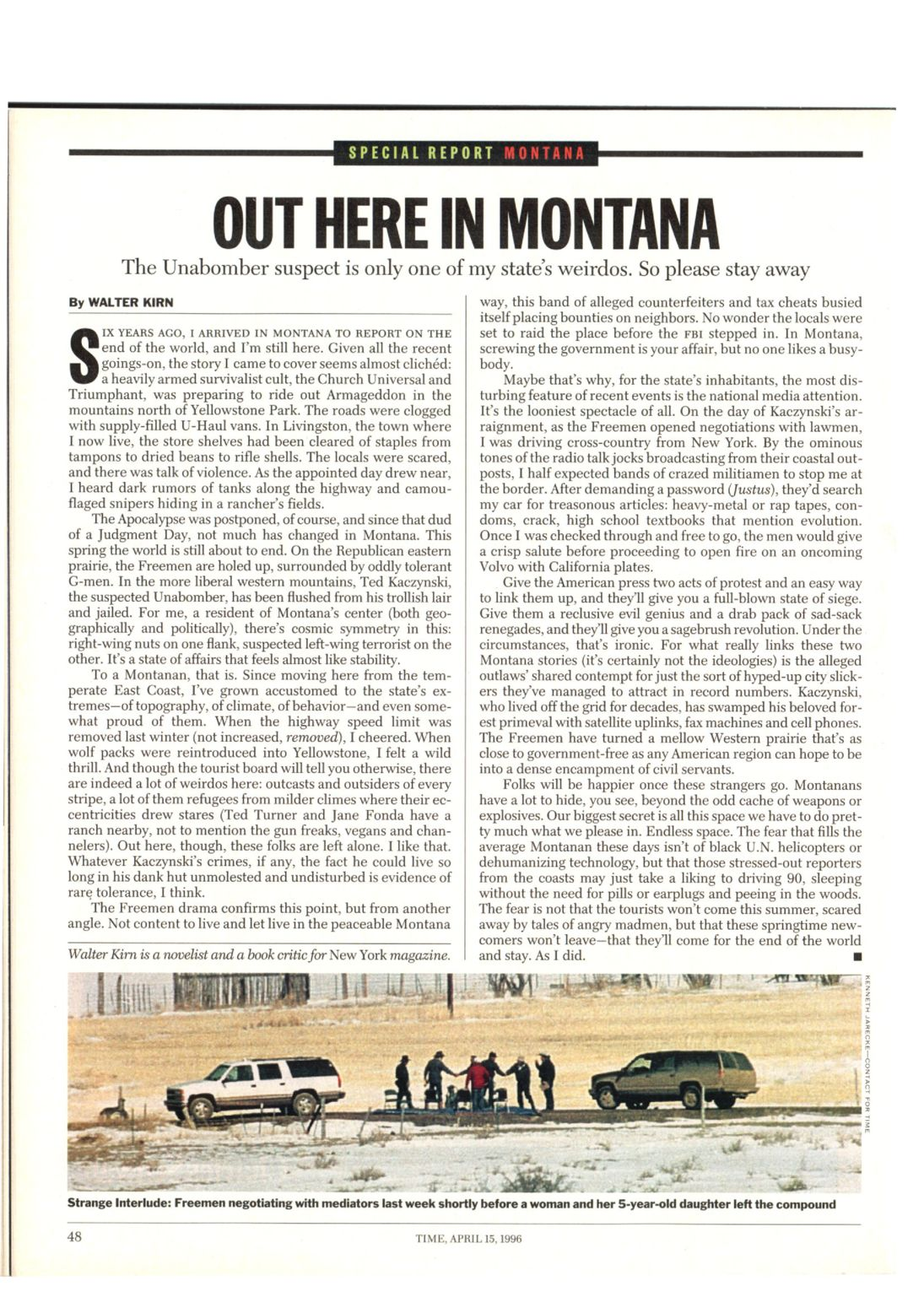Walter Kirn
Out Here in Montana
The Unabomber suspect is only one of my state's weirdos. So please stay away
SIX YEARS AGO, I ARRIVED IN MONTANA TO REPORT ON THE end of the world, and I'm still here. Given all the recent goings-on, the story I came to cover seems almost cliched: a heavily armed survivalist cult, the Church Universal and Triumphant, was preparing to ride out Armageddon in the mountains north of Yellowstone Park. The roads were clogged with supply-filled U-Haul vans. In Livingston, the town where I now live, the store shelves had been cleared of staples from tampons to dried beans to rifle shells. The locals were scared, and there was talk of violence. As the appointed day drew near, I heard dark rumors of tanks along the highway and camouflaged snipers hiding in a rancher's fields.
The Apocalypse was postponed, of course, and since that dud of a Judgment Day, not much has changed in Montana. This spring the world is still about to end. On the Republican eastern prairie, the Freemen are holed up, surrounded by oddly tolerant G-men. In the more liberal western mountains, Ted Kaczynski, the suspected Unabomber, has been flushed from his trollish lair and jailed. For me, a resident of Montana's center (both geographically and politically), there's cosmic symmetry in this: right-wing nuts on one flank, suspected left-wing terrorist on the other. It's a state of affairs that feels almost like stability.
To a Montanan, that is. Since moving here from the temperate East Coast, I've grown accustomed to the state's extremes--of topography, of climate, of behavior--and even somewhat proud of them. When the highway speed limit was removed last winter (not increased, removed), I cheered. When wolf packs were reintroduced into Yellowstone, I felt a wild thrill. And though the tourist board will tell you otherwise, there are indeed a lot of weirdos here: outcasts and outsiders of every stripe, a lot of them refugees from milder climes where their eccentricities drew stares (Ted Turner and Jane Fonda have a ranch nearby, not to mention the gun freaks, vegans and channelers). Out here, though, these folks are left alone. I like that. Whatever Kaczynski's crimes, if any, the fact he could live so long in his dank hut unmolested and undisturbed is evidence of rare tolerance, I think.
The Freemen drama confirms this point, but from another angle. Not content to live and let live in the peaceable Montana way, this band of alleged counterfeiters and tax cheats busied itself placing bounties on neighbors. No wonder the locals were set to raid the place before the FBI stepped in. In Montana, screwing the government is your affair, but no one likes a busybody.
Maybe that's why, for the state's inhabitants, the most disturbing feature of recent events is the national media attention. It's the looniest spectacle of all. On the day of Kaczynski's arraignment, as the Freemen opened negotiations with lawmen, I was driving cross-country from New York. By the ominous tones of the radio talk jocks broadcasting from their coastal outposts, I half expected bands of crazed militiamen to stop me at the border. After demanding a password (Justus), they'd search my car for treasonous articles: heavy-metal or rap tapes, condoms, crack, high school textbooks that mention evolution. Once I was checked through and free to go, the men would give a crisp salute before proceeding to open fire on an oncoming Volvo with California plates.
Give the American press two acts of protest and an easy way to link them up, and they'll give you a full-blown state of siege. Give them a reclusive evil genius and a drab pack of sad-sack renegades, and they'll give you a sagebrush revolution. Under the circumstances, that's ironic. For what really links these two Montana stories (it's certainly not the ideologies) is the alleged outlaws' shared contempt for just the sort of hyped-up city slickers they've managed to attract in record numbers. Kaczynski, who lived off the grid for decades, has swamped his beloved forest primeval with satellite uplinks, fax machines and cell phones. The Freemen have turned a mellow Western prairie that's as close to government-free as any American region can hope to be into a dense encampment of civil servants.
Folks will be happier once these strangers go. Montanans have a lot to hide, you see, beyond the odd cache of weapons or explosives. Our biggest secret is all this space we have to do pretty much what we please in. Endless space. The fear that fills the average Montanan these days isn't of black U.N. helicopters or dehumanizing technology, but that those stressed-out reporters from the coasts may just take a liking to driving 90, sleeping without the need for pills or earplugs and peeing in the woods. The fear is not that the tourists won't come this summer, scared away by tales of angry madmen, but that these springtime newcomers won't leave--that they'll come for the end of the world and stay. As I did.
Walter Kirn is a novelist and a book critic for New York magazine.

